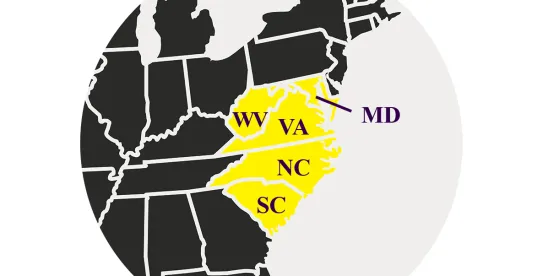Enforcement under the major federal environmental statutes is often - but not always - filed by state or federal regulators. However, the statutes generally give private parties avenues to pursue litigation when regulators ― made aware of issues given rise to the litigation by way of a pre-litigation notice letter ― decline to pursue claims.
The Fourth Circuit’s decision in Naturaland Trust v. Dakota Finance LLC, available here, evaluates the question of whether a state agency’s service of a notice of alleged violation (NOV) was by itself enough to bar a private party claim under the Clean Water Act (CWA). And – in this panel’s view – it does not.
Naturaland Trust is instructive because it stresses that anyone who receives a CWA pre-litigation notice from a private party needs to engage with regulators, at least in Fourth Circuit constituent states, to ensure that they have something more than a NOV before any pre-litigation notice period expires and the private party who served the pre-litigation notice is permitted to file suit. The notice period is designed to allow dialogue with relevant regulators. However in Naturaland, according to the Fourth Circuit, this dialogue never reached a conclusion sufficient to preclude the filing of a private-party citizen enforcement suit.
Factual Background
The case stems from property in South Carolina where developers were seeking to operate an event space called Arabella Farm. In 2017, Arabella Farm began cleaning 20 acres of land on the property which was bounded by three streams. Even though a land disturbance of this size in close proximity to water would generally require - among other things - obtaining a CWA stormwater permit, Arabella Farm claimed its work fell within a CWA agricultural exemption and did not seek any permits or to control sediment runoff. This allegedly resulted in significant discharges of sediment-laden stormwater onto nearby properties and caused widespread erosion.
State regulators noticed Arabella Farm’s site development activities in 2019 and began inspecting the property to evaluate the Farm’s compliance with the National Pollutant Discharge Elimination System (NPDES) program, which is administered by South Carolina environmental regulators. After the inspections, state regulators sent Arabella Farm a “Notice of Alleged Violation/Notice of Enforcement Conference,” which informed the farm of a voluntary “informal” enforcement conference which had been scheduled for September 2019. This conference was closed to the public and the media.
In November 2019, Naturaland Trust and Trout Unlimited - environmental non-profit organizations (NGOs) - sent a notice to the Farm operators detailing alleged CWA violations. After the required 60-day notice period, the NGOs filed a suit under CWA seeking an injunction and civil penalties. A South Carolina district court dismissed the NGO’s complaint on the grounds that the court lacked subject matter jurisdiction over the NGO’s claims because state regulators had commenced and were diligently prosecuting an action for the same violations by way of the NOV.
Legal Background
Citizen enforcement has played a major role in shaping environmental law in recent years and we’ve accordingly blogged about citizen suits with some regularity. (See here, here, and here). The key question in Naturaland involves a CWA bar to citizen suits called the “diligent prosecution bar,” which provides that a “violation . . . shall not be the subject of a civil penalty action” under CWA if “a State has commenced and is diligently prosecuting an action” with respect to that same violation “under a State law comparable” to the federal scheme for assessing civil penalties. Even though CWA’s diligent prosecution bar appears facially limited to “civil penalty actions,” i.e. actions seeking monetary damages, the majority found that the NGO’s injunctive claims fell within this provision’s ambit.
The “diligent prosecution bar” often involves litigation, but the NOV at issue here was held to be an informal, non-public, and an administrative, pre-litigation process. A majority of the three-judge Fourth Circuit panel found that the “diligent prosecution bar” did not apply because the NOV was not a “case” or “suit,” and more specifically, was not an adversarial proceeding initiated by a formal public document. In the majority’s view, the NOV did not “commence” an action; it was instead “like a demand letter before civil litigation.” Accordingly, the diligent prosecution bar did not apply and the NGO’s suit about the same facts could proceed.
The dissenting judge focused on federalism. In the dissent’s view, the NOV was a fundamental part of South Carolina state regulator’s environmental enforcement regime and “the majority’s decision elevates citizen suits above their supplemental role” to proceedings filed by state or federal regulators. Because the NOV was part of the state’s administrative process for resolving claims like this, the dissenting judge would have found that the NGO could not pursue CWA claims. Finally, the dissent sought to remand the NGOs’ injunctive claims to the district court as textually, the “diligent prosecution bar” applies only to “civil penalty actions.” The dissent noted however, that “injunctive relief seems questionable . . . when a state has commenced, and is diligently prosecuting” a state-law action comparable to CWA.



 />i
/>i

